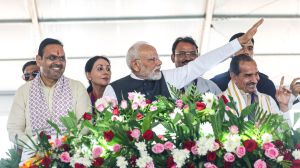Since its inception in 1962, only 14 research studies at tribal institute
Last benchmark survey was done 20 years ago; institute, a national body, blames staff-crunch.
 Tribal Research Training Institute was tasked to survey tribal issues. (Express)
Tribal Research Training Institute was tasked to survey tribal issues. (Express)
In September 2006, as per the order of the Government of India, city-based Tribal Research Training Institute (TRTI) began a research study on the topic ‘Reservation provided to tribes in central and state government offices and other government undertakings’. The research study was scheduled to conclude in 40 weeks, by July 2007. However, it couldn’t be finished even by 2014.
As per the reply received to the query filed by The Indian Express under the Right to Information Act 2005, between 1962 to 2014 — a period of 52 years — TRTI has carried out just 14 research studies, which is surprising, given the fact that on an average, a research study takes six months to a year. Out these 14 research studies, three were carried out between 2004 and 2014.
[related-post]
Admitting that the number of research studies vis-a-vis the duration in which they were carried out, was substantially low, TRTI Commissioner Sambhajirao Sarkunde said, “Carrying out a research study depends on a lot of factors such as staff, funds, volume of data to be collected and also on the commissioner heading TRTI. The same factors can play a role in delay as well as speeding up of the research study. Staff shortage has been one of the main reasons for less number of research studies by TRTI.” The topics of the research study, he said, were suggested by the Government of India, state government and sometimes were also chosen by TRTI. The institute was established in 1962 with various objectives — conduct research into the traits, customs, culture and characteristics of tribal communities; carry out surveys that covered socio-economic problems of tribals; organise training of workers in tribal welfare; and give technical guidance to various departments in implementing various schemes for tribal welfare.
As far as staff shortage is concerned, the reply to RTI query also revealed that though there were 66 sanctioned posts for TRTI, 16 posts were vacant as on date, which included important positions such as assistant director, revision assistant, statistical officer, four posts of assistant statistical officer and senior and junior researcher, among other junior positions.
In addition to research studies, carrying out benchmark surveys is one of the prime objectives of TRTI, but here too the institute has failed miserably. Sarkunde informed that the last survey was done two decades ago in 1995-96. Sarkunde admitted that the figures and findings of the survey didn’t hold much importance now given that it was 20 years old and also the fact that state’s tribal population itself had grown by more than 20 per cent. “Ideally, just like the census is conducted, benchmark surveys should be done every 10 years because the statistics become outdated after a period of time. Formation of policies and programmes should be based on the latest indicators and data. The staff do not have resources conduct benchmark surveys and hence we planned to outsource work,” he added.







